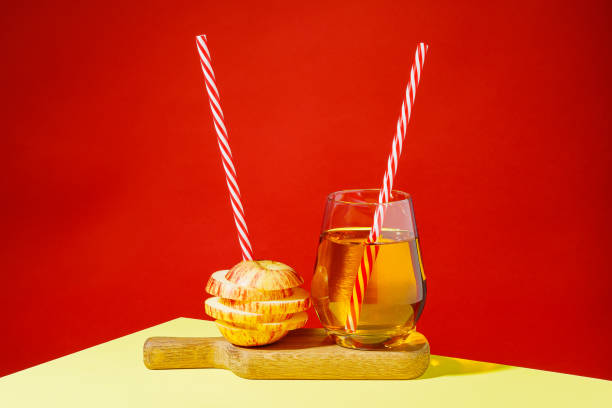Die Organisation FoodWatch hat verschiedene Säfte getestet und das erschreckende Ergebnis: In mehreren Produkten wurden vermehrt der Einsatz von Rinder- und Schweinegelatine nachgewiesen – ohne dies auf der Verpackung anzugeben. Welche Säfte sind davon betroffen und welche kann man bedenkenlos trinken?
Juice is vegan, of course. It’s just fruit. Or? You really don’t think about the fact that this could contain gelatine when you put the apple juice in the shopping basket in the supermarket. For example, one might frown at first if a juice carries the label “vegan” or “vegetarian”. But a test by the FoodWatch organization has now shown why this is so important.
Why aren’t juices vegan?

The test came about because there are significant gaps in the labeling of the use of animal components in food production. Flavors of animal origin (e.g. in chips), technical additives of animal origin (e.g. in juices), animal cysteine (in bread), or additives of animal origin such as colorings (e.g. in sweets) do not have to be identified.
This is deceptive, especially with plant products, since no animal additives are expected there. Manufacturers often cloud apple juice with gelatine. The gelatine is added when the naturally cloudy juice is filtered and then filtered out again later – the cloudy substances in the apple juice are extracted.
The result: Gelatine is no longer detectable in the clear apple juice product and it, therefore, does not have to be labeled as food containing animal products.
There are also alternative methods of clarifying apple juice: Manufacturers such as Beckers Bester and Eckes Granini, for example, use mechanical filtering, known as ultrafiltration. Plant-based products such as pea protein can also be used instead of animal gelatin.
The result
FoodWatch bought a total of over 30 apple juices from various manufacturers at Edeka, Lidl, and Rewe – both Edeka and Rewe’s own brands and branded products such as Pfanner and Valentina. The test included apple juice, apple nectar, and apple spritzer.
More than every third apple juice or apple nectar failed. The apple spritzers also perform similarly poorly: five out of 14 juices are made using gelatine or clarification with the help of gelatine cannot be ruled out.
By the way, the most commonly used gelatine is pork. Only the manufacturer Lichtenauer stated that they also use beef gelatine in the production of the apple spritzer. Incidentally, both brand manufacturers and private labels are affected: from Albi to Adelholzer to Rewe Bio.
The manufacturers Pfanner, Beckers Bester, and Valentina were praised because they replace the animal gelatine with a plant-based gelatine substitute such as pea gelatine or achieve clarification through ultrafiltration. We have already reported about a juice for vegans in our veggie blog.
Juices with animal gelatine
These products failed:
- Albi apple clear:
- Buchholz apple juice direct juice
- Obstland Sachsenobst apple juice
- Lausitzer Lockwitzgrund clear apple
- From here apple juice
- Adelholzener Alpenquellen organic apple spritzer
- Gerolsteiner apple spritzer
- Lichtenau mineral springs premium spritzer apple
- We organic apple juice spritzer
- Yes! apple nectar and yes! apple spritzer
- Our best choice is apple juice
Clear labeling must be!

FoodWatch says clearly: Anyone who uses animal gelatine in the production of juices must also state this clearly on the packaging. This is the only way the buyer can make an informed decision. This is essential, especially for people who want to consciously avoid animal products!
